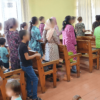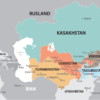It was a miracle that no one died from poisoning or was injured when a church in southern Kazakhstan suffered a poison attack on May 7 during worship.
A man had brought two bottles of poison in a carrier bag, which he poured on the floor during the service, close to the entrance door. The man ran out of the church and the poison turned into a thick yellow smoke, causing people to flee in panic towards the emergency exit.
Others chose to jump out of second floor windows, but no one was seriously injured and all escaped poisoning.
Police and emergency vehicles were immediately called by phone, but it was a full 2 1/2 hours before anyone
appeared. There are therefore many indications that the intelligence service had staged this.
Subsequently, the church has complained to the authorities through the churches' joint organization, after which the intelligence service has proposed to install their surveillance cameras in and around the church to secure it against a repetition. This proposal is of course absurd, as it would mean that the intelligence services could completely monitor the church.
Kazakhstan just 3 years ago: Sanctuary for the Church in Central Asia
This latest attack is an example of a dramatic escalation in the persecution of Christians in Kazakhstan.
In the years following the collapse of the Soviet Union in 1991, Kazakhstan oriented itself towards the West. This applied both to the implementation of market economy reforms, but also to ensuring civil liberties, including freedom of religion. Thus, Kazakhstan has largely been a sanctuary for the church in Central Asia, unlike neighboring countries such as Turkmenistan and Uzbekistan, where the persecution of Christians has been very severe for many years.
Danish European Mission was on the spot
For several years, the Danish European Mission has continuously monitored developments in Kazakhstan. Already in the August-September 2011 issue of the Danish European Mission magazine, fundraising for a project to strengthen the church in Kazakhstan began.
The project supports Christian rehabilitation work among drug addicts, alcoholics and homeless people in a part of the country that is characterized by great social need. Not only can these disadvantaged people get a new life through the project, but the authorities can also see how people's lives are transformed. In doing so, the authorities may realize that accepting the gospel of Jesus Christ and aligning society with the words of the Bible can only make a positive difference in their country.






